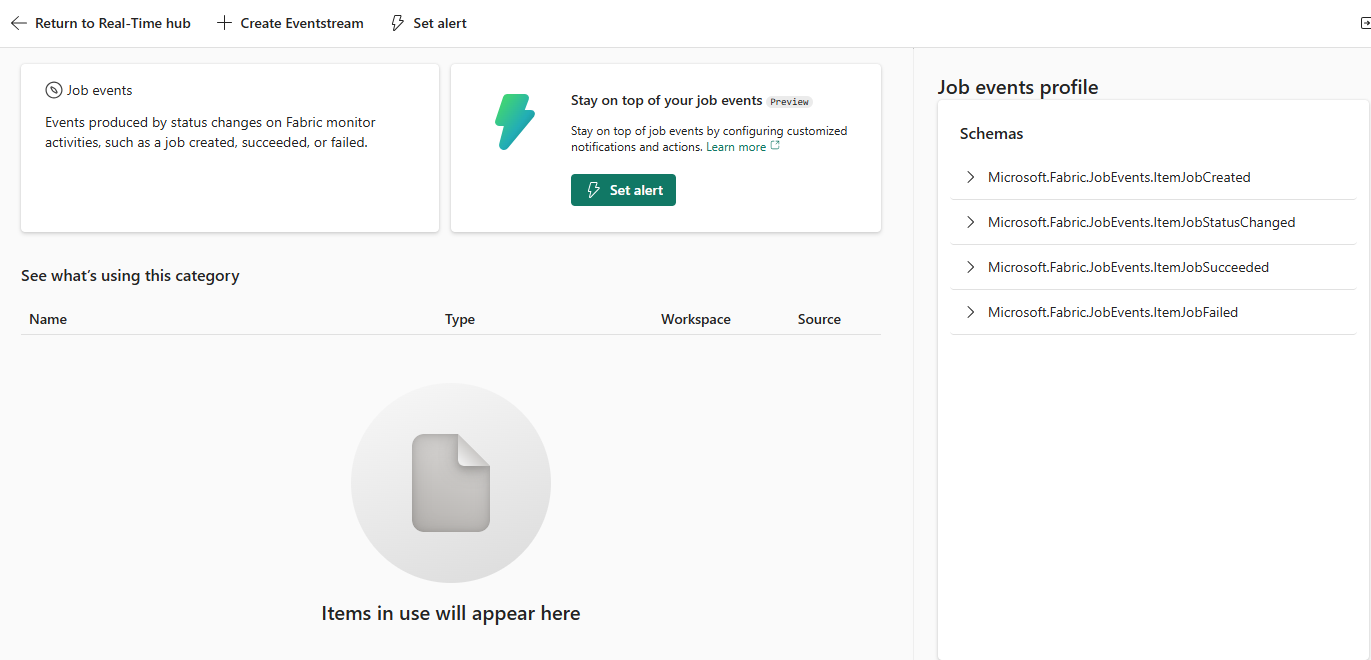Erkunden von Auftragsereignissen im Fabric-Echtzeit-Hub (Vorschau)
Mit dem Echtzeit-Hub können Sie Änderungen suchen und abonnieren, die bei der Ausführung eines Auftrags durch Fabric entstehen. Sie können beispielsweise beim Aktualisieren eines Semantikmodells, beim Ausführen einer geplanten Pipeline oder beim Ausführen eines Notizbuchs auf Änderungen reagieren. Jede dieser Aktivitäten kann einen entsprechenden Auftrag generieren, der wiederum eine Reihe entsprechender Auftragsereignisse generiert.
Mit Job-Ereignissen können Sie Job-Ergebnisse in Echtzeit überwachen und Warnungen mithilfe der Data Activator-Benachrichtigungsfunktionen einrichten. Wenn der Scheduler z. B. einen neuen Auftrag auslöst oder ein Auftrag fehlschlägt, können Sie eine E-Mail-Benachrichtigung erhalten. Auf diese Weise können Sie auch dann, wenn Sie sich nicht vor dem Computer befinden, immer noch die Informationen abrufen, die Sie interessieren.
Anmerkung
Das Verwenden von Fabric- und Azure-Ereignissen über Eventstream oder Fabric Activator wird nicht unterstützt, wenn sich die Kapazitätsregion des Eventstreams oder von Activator in den folgenden Regionen befindet: „Indien, Westen“, „Israel, Mitte“, „Südkorea, Mitte“, „Katar, Mitte“, „Republik Singapur“, „VAE, Mitte“, „Spanien, Mitte“, „Brasilien, Südosten“, „USA, Mitte“, „USA, Süden-Mitte“, „USA, Westen 2“ und „USA, Westen 3“.
Anzeigen der Detailseite „Auftragsereignisse“
Wählen Sie unter Echtzeit-Hub Fabric-Ereignisse aus.
Wählen Sie Auftragsereignisse in der Liste aus.
Die Detailansicht für Auftragsereignisse sollte angezeigt werden.
Aktionen
Oben auf der Detailseite werden die folgenden beiden Aktionen angezeigt.
Eventstream erstellen: Damit können Sie einen Eventstream basierend auf Ereignissen aus dem ausgewählten Auftrag erstellen.
Legen Sie die Benachrichtigungfest, die es Ihnen ermöglicht, eine Warnung zu setzen, wenn ein Vorgang für einen Auftrag ausgeführt wird, wie z. B. wenn ein Auftrag erstellt oder geändert wird.

Anzeigen, wovon diese Kategorie verwendet wird
Dieser Abschnitt zeigt die Artefakte, die Auftragsereignisse verwenden. Hier sind die Spalten und deren Beschreibungen:
| Spalte | Beschreibung |
|---|---|
| Name | Name des Objekts, das Auftragsereignisse verwendet |
| Typ | Artefakttyp – Datenaktivator oder Eventstream |
| Arbeitsbereich | Arbeitsbereich, in dem sich das Artefakt befindet. |
| Quelle | Name des Arbeitsbereichs, der Quelle der Ereignisse ist. |
Profil der Auftragsereignisse

Ereignistypen
| Ereignistypname | Beschreibung |
|---|---|
| Microsoft.Fabric.ItemJobCreated | Wird ausgelöst, wenn die Fabric-Plattform einen Auftrag erstellt oder auslöst (manuell oder geplant). |
| Microsoft.Fabric.ItemJobStatusChanged | Wird ausgelöst, wenn sich der Auftragsstatus in einen anderen nicht terminalen Zustand ändert. Dieses Ereignis wird nicht ausgelöst, wenn die Workload bei einer Änderung keinen Pushvorgang ausführt. Der Auftragsstatus kann sich direkt von „Erstellt“ zu „Abgeschlossen“ ändern. |
| Microsoft.Fabric.ItemJobSucceeded | Wird ausgelöst, wenn der Auftrag erfolgreich abgeschlossen wurde. |
| Microsoft.Fabric.ItemJobFailed | Wird ausgelöst, wenn ein Fehler beim Auftrag auftritt, etwa wenn der Auftrag hängen bleibt oder abgebrochen wird. |
Schemata
Ein Ereignis enthält die folgenden Daten auf oberster Ebene:
| Eigentum | Typ | Beschreibung | Beispiel |
|---|---|---|---|
source |
Zeichenfolge | Gibt den Kontext an, in dem ein Ereignis aufgetreten ist. Eine Mandanten-ID. | aaaaaaaa-0000-1111-2222-bbbbbbbbbbbb |
subject |
Zeichenfolge | Identifiziert den Antragsteller des Ereignisses im Kontext des Ereignisproduzenten. | /workspaces/<WORKSPACEID>/items/<ARTIFACTID>/jobs/instances/{JOBID} |
type |
Zeichenfolge | Einer der registrierten Ereignistypen für die Ereignisquelle. | Microsoft.Fabric.ItemJobCreated |
time |
Zeitstempel | Die Zeit, in der das Ereignis generiert wird, basierend auf der UTC-Zeit des Anbieters. | 2017-06-26T18:41:00.9584103Z |
id |
Zeichenfolge | Eindeutiger Bezeichner für das Ereignis. | bbbbbbbb-1111-2222-3333-cccccccccccc |
data |
Objekt | Ereignisdaten. | Weitere Informationen finden Sie in der nächsten Tabelle. |
specversion |
Zeichenfolge | Die Version der Cloudereignisspezifikation. | 1.0 |
dataschemaversion |
Zeichenfolge | Die Version des Datenschemas. | 1.0 |
capacityId |
GUID | Die Kapazitäts-ID. | bbbbbbbb-1111-2222-3333-cccccccccccc |
Das data-Objekt weist die folgenden Eigenschaften auf:
| Eigentum | Typ | Beschreibung | Beispiel |
|---|---|---|---|
data.itemId |
GUID | Die ID des Elements oder Artefakts. | cccccccc-8888-9999-0000-dddddddddddd |
data.itemKind |
Zeichenfolge | Die Art oder der Typ des Gegenstands oder Artefakts. | Lakehouse |
data.itemName |
Zeichenfolge | Der Name des Elements oder Artefakts. | myitem |
data.workspaceId |
GUID | Die ID des Arbeitsbereichs. | aaaaaaaa-0000-1111-2222-bbbbbbbbbbbb |
data.workspaceName |
Zeichenfolge | Der Name des Arbeitsbereichs. | myworkspace |
data.executingPricipalId |
GUID | ID des Dienstprinzipals, die zum Ausführen des Auftrags verwendet wird. | a0a0a0a0-bbbb-cccc-dddd-e1e1e1e1e1e1 |
data.executingPriciplaType |
Zeichenfolge | Der Typ der ausführenden Prinzipal-ID. | User or Service Principal |
data.jobInstanceId |
GUID | Die ID des Auftrags. | dddddddd-3333-4444-5555-eeeeeeeeeeee |
data.jobStatus |
Zeichenfolge | Der Status dieses Auftrags. | InProgress |
data.jobType |
Zeichenfolge | Der Typ dieses Auftrags. | RunNotebook |
data.jobInovkeType |
Zeichenfolge | Der Aufruftyp dieses Auftrags. | Scheduled or Manual |
data.jobScheduleTime |
Zeitstempel | Die geplante Zeit des Auftrags. | 2017-06-26T18:41:00.9584103Z |
data.jobStartTime |
Zeitstempel | Die Startzeit des Auftrags. | 2017-06-26T18:41:00.9584103Z |
data.jobEndTime |
Zeitstempel | Die Endzeit des Auftrags. | 2017-06-26T18:41:00.9584103Z |

